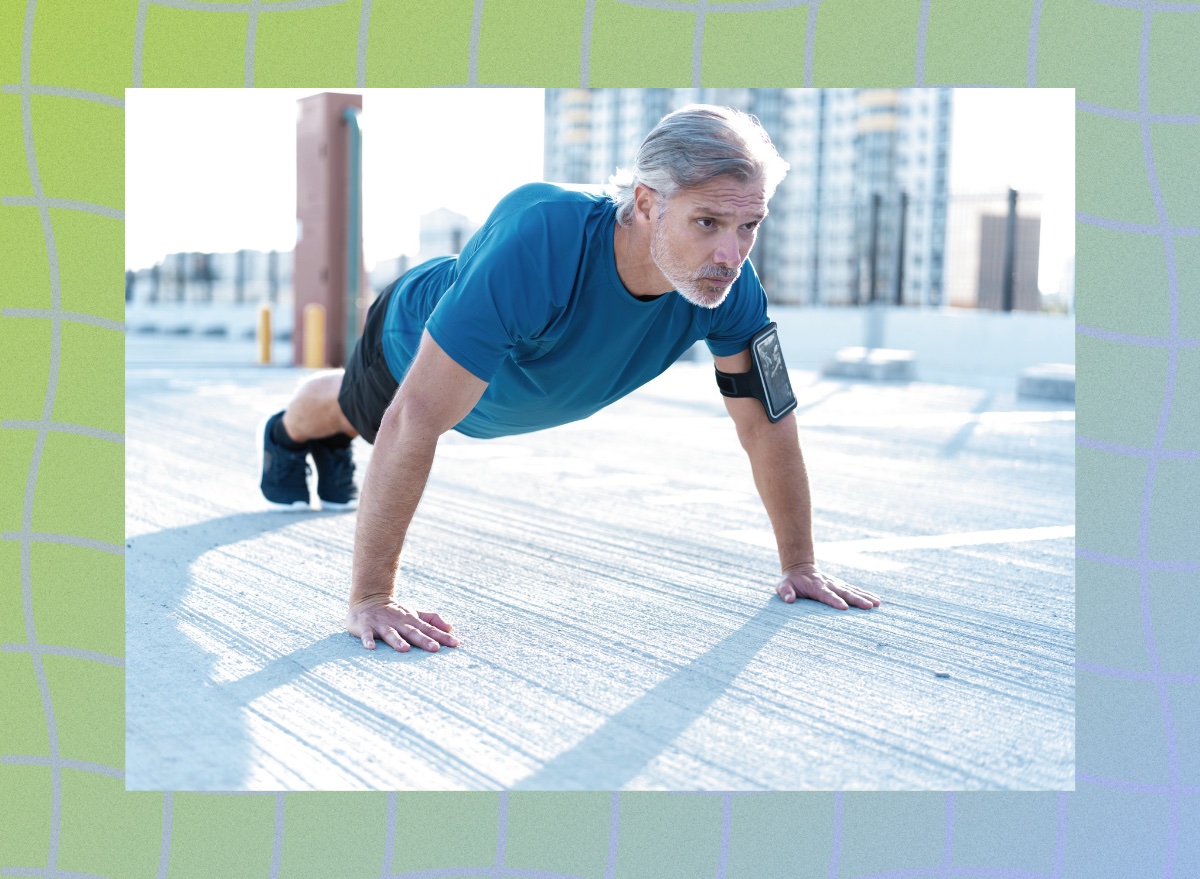Discover “10 Healthiest Sources of Protein You Can Eat” Americans seem to be obsessed with protein, thanks in part to the large body of research showing that protein can help with weight maintenance, body composition and is important for maintaining a healthy immune system.
The Recommended Dietary Allowance for protein is 0.8 grams per kilogram of body weight (0.37 grams per pound). That is considered the minimal amount to ward off a deficiency but is not considered the ideal amount for most of us. Many researchers believe that a more optimal amount of protein is closer to 1.2-1.4 grams per kilogram body weight or 0.6-0.9 grams per pound. Physically active individuals need more protein to help muscles build and repair post-exercise. According to research, older individuals also need more protein than the Recommended Dietary Allowance (RDA) because aging reduces the body’s ability to process protein, and that can exacerbate muscle losses, that occur as we age.
10 Healthiest Sources of Protein You Can Eat
A simpler way to put these recommendations into practice is to focus on getting 20-30 grams of protein at each of your three main meals. This is the preferred way to consume protein because it can help the body digest and absorb the essential amino acids protein foods provide.
Eating more high-quality protein is the best way to get the optimal amount of protein in your diet. However, protein-rich foods vary in their nutritional quality. Many animal-based protein foods, like fatty cuts of red meat and processed deli meats, are known to increase the risk of heart disease and certain types of cancer.
Here are 10 protein-packed foods to add to your shopping cart to ensure that you are getting the healthiest sources of protein in your diet. Read on, and for more, don’t miss 16 Easy Ways To Increase Your Protein Intake.
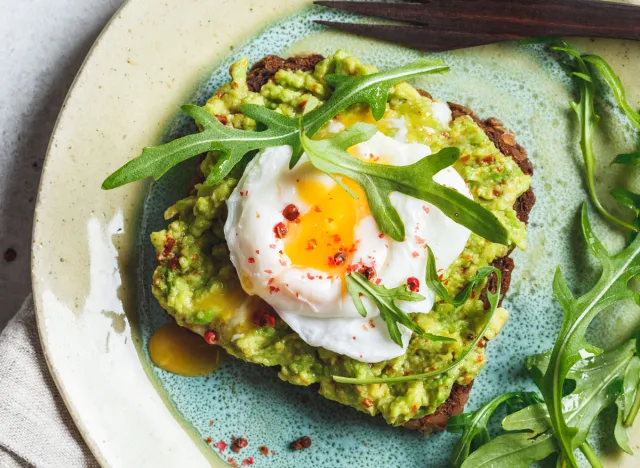

Eggs are often referred to as the gold standard for protein. A study published in the journal Nutrients reaffirmed that egg protein has been recognized to be highly digestible and an excellent source of all nine essential amino acids, with the highest attainable protein digestibility-corrected amino acid score of all protein sources.
One large egg has 70 calories and provides more than 13 essential nutrients, including iron, vitamin D, iron, zinc, lutein, zeaxanthin, and choline. Eggs also pack six grams of high-quality protein and antioxidants. Eggs may also help you maintain a healthy weight: Studies show that eating eggs for breakfast reduces hunger and decreases calorie consumption at lunch and throughout the day. In an egg vs. bagel research study, subjects who ate an egg breakfast versus the same calorie breakfast of bagels lost 65% more weight and significantly more belly fat compared to those who ate the bagel breakfast. Eggs have also been shown to help protect against infections and provide anti-cancer benefits.
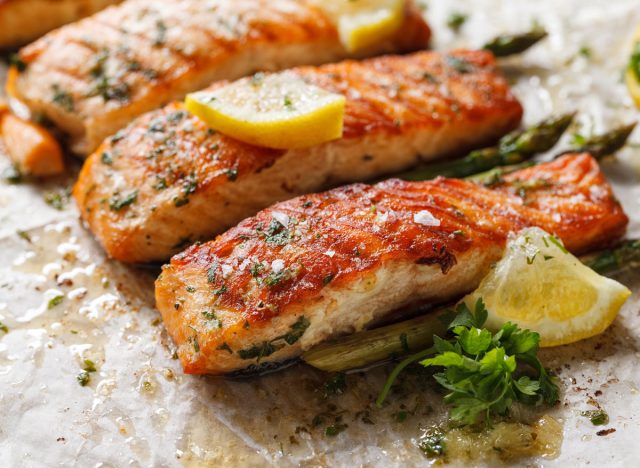

Fish and seafood are two of the healthiest high-quality proteins to include in your diet. Not only does seafood contain all nine essential amino acids for health, but a serving (three ounces) of tuna or shrimp provides about a third of your daily recommended protein intake or 20-25 grams of protein. What’s more, compared to other high-quality protein sources, fish is significantly lower in calories, with about 100 calories per standard 3-ounce serving. Fish is so healthy that the Dietary Guidelines for Americans and the American Heart Association recommend eating at least two to three servings of fish per week (about six to eight ounces cooked) to get the recommended 250 milligrams a day of EPA and DHA, the beneficial long-chain omega-3 fatty acids. These fatty acids are known to help reduce the risk of cardiovascular diseases and tamp down inflammation along with other health benefits.


Europeans have been enjoying Greek yogurt for centuries, but it’s become increasingly popular here since Americans have steadily shied away from the sugary, fruit-on-the-bottom type yogurts or candy mix-ins to enjoy a more wholesome, protein-packed yogurt. Greek yogurt is considered a healthier yogurt because its unique straining process removes the liquid whey resulting in a thicker, creamier yogurt with twice the protein of traditional yogurt. It’s also an excellent source of calcium and it provides probiotics to help support immune and GI function.
READ RELATED: Burger King Will Close 26 Restaurants By Mid-April
A six-ounce serving of most Greek yogurt brands will provide more than 15 grams of protein for about 100 calories for a nonfat, no added sugar variety. To ensure that you choose the healthiest strained yogurt, be sure to look to make sure you find a Greek yogurt with minimal added sugar. Greek yogurt is a great post-workout treat and one study published in Frontiers in Nutrition reported that untrained individuals who included Greek yogurt in their diet, as part of a 12-week training program, gained more muscle mass and reduced body fat compared to those who undertook the same training but didn’t add Greek yogurt to their diet. The subjects ate Greek yogurt three times a day on training days and twice on off days.
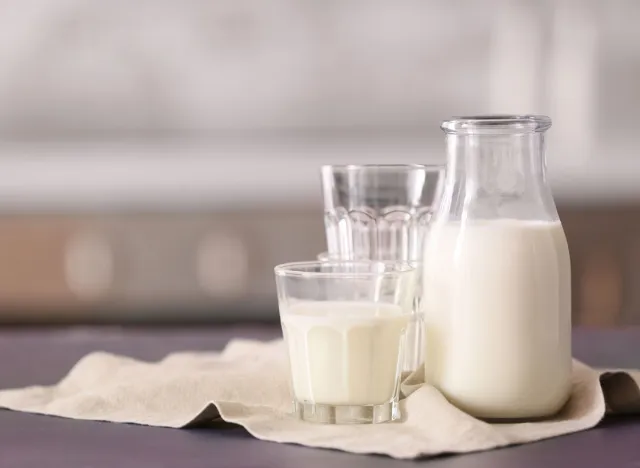

Dairy milk is a great option for those seeking to add beneficial protein to their diet. Cow’s milk provides two types of protein: casein, and whey. Casein makes up about 80% of the protein and whey accounts for about 20%. Whey is digested and absorbed quickly while casein is digested more slowly and helps to enhance satiety. Milk provides about one gram of protein per ounce, so an eight-ounce glass of any type of cow’s milk, from skim to full fat, provides eight grams of protein. In addition to packing in protein, cow’s milk is rich in calcium, vitamin D, B vitamins, and potassium, among other nutrients. If you buy grass-fed milk, you’ll also get more beneficial conjugated linoleic acid and omega-3 fatty acids. Several studies, including one published in Clinical Chemistry, show that milk drinkers tend to have more lean muscle mass and better body composition. Athletes often enjoy milk and other dairy foods in their diet to enhance recovery and build and maintain muscle mass.
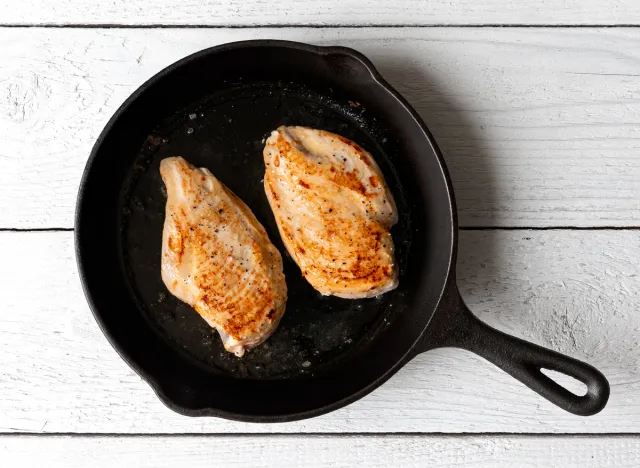

We all know that chicken breast is one of the best sources of lean protein. But did you know that a serving of chicken breast packs in more protein ounce-for-ounce compared to beef? A 3-ounce serving of cooked chicken breast has around 28 grams of protein and 140 calories, according to the USDA’s nutrient database Chicken with the skin on will have twice as much fat as skinless breast meat, so it’s best to enjoy skinless. Chicken breast also packs in more than protein, it is rich in B vitamins, selenium, and phosphorus, and also provides potassium, magnesium, and zinc. A study published in Food and Nutrition Research also notes that the fat content of skinless chicken breast is just one percent of the fat and just a third is unhealthful saturated fat. The research also suggests that lean chicken breast may help with weight maintenance, due to the high satiety effects of the protein in chicken. Eating chicken breast in lieu of higher-fat animal proteins can also reduce your risk for cardiovascular disease and type 2 diabetes.


Turkey breast is another great option to get more high-quality lean protein in your diet. Nutritionally very similar to skinless chicken breast, a three-ounce serving of turkey breast provides about 25 grams of protein for just 135 calories. Skinless turkey breast also provides B vitamins, niacin, selenium, and zinc. It’s also low in fat like skinless chicken breast. For your health, it’s best to skip processed meats, like turkey deli meat, and stick to minimally processed turkey that you can roast and enjoy for several meals. A review article published in the peer-reviewed journal Nutrients points out that red meat and processed meat consumption may increase the risk for certain types of cancer while white meats do not.
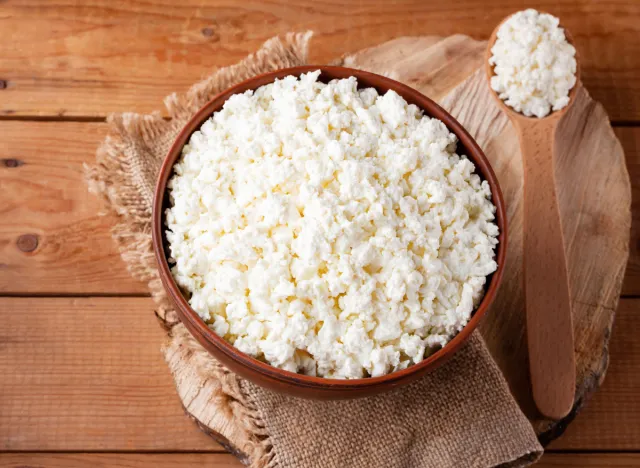

Cottage cheese has the reputation of being the quintessential diet food since the 70s, but it’s made a huge comeback in recent years, thanks in part to its stellar nutritional profile that athletes and other health-conscious eaters seek. Low-fat cottage cheese provides more protein per calorie than most other foods. A typical low-fat plain cottage cheese provides around 14 grams of protein and 100 calories in a half-cup serving and it’s a good source of calcium. One study reported in the journal Appetite found that equal calorie snacks of egg or cottage cheese provide similar satiating benefits, helping study participants eat less after snacking on an egg or cottage cheese snack. The protein in cottage cheese is about 80% slow-release casein, making it great to help you stay fuller longer, help moderate blood sugar levels, and help your muscles recover post-exercise.
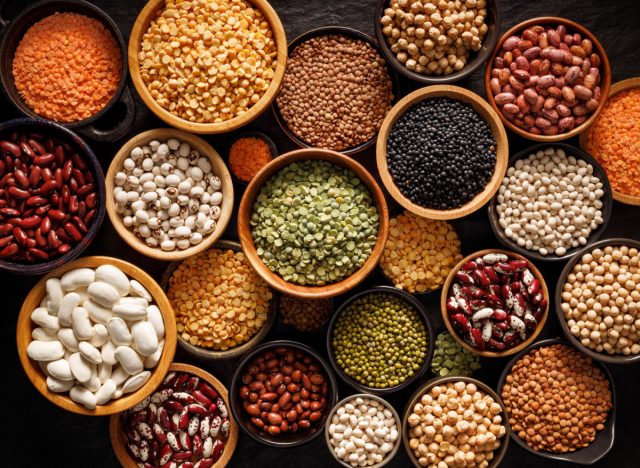

For a plant-based source of protein, beans are one of the healthiest options to enjoy. A cup of beans provides about 15 grams of protein, and you get the added benefit of all the fiber, antioxidants, zinc, B vitamins, potassium, magnesium, and many other nutrients beans provide. Beans are particularly filling, thanks to the one-two punch of protein and fiber. Research published in the American Journal of Clinical Nutrition reports that beans provide beneficial polyphenols that help lower harmful LDL-cholesterol and reduce the risk for metabolic syndrome, heart disease, and type 2 diabetes. Beans are considered so beneficial for health that the Dietary Guidelines for Americans recommend eating three cups of beans and legumes each week, which equals half a cup per day.
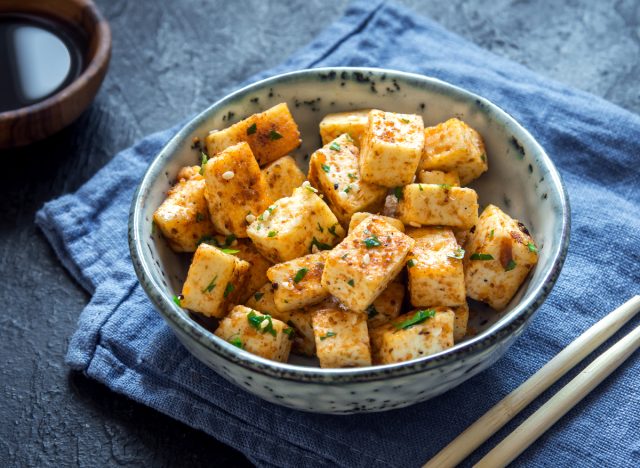

Soy foods are one of the best plant-based proteins to add to your diet, especially if you eat a more plant-based diet. Soy foods contain protein that has all nine essential amino acids, making them a complete protein. Compared to animal proteins, soy has low amounts of saturated fat, which makes it a heart-smart protein option. A cup of edamame (steamed immature soybeans in pods) provides about 17 grams of protein, 8 grams of fiber, and around 200 calories. Soybeans are an excellent source of fiber and magnesium, and they also provide iron, B vitamins, omega-3 fats, and many other important nutrients. Soybeans also provide isoflavones that studies show help maintain bone health and may protect against certain types of cancer.
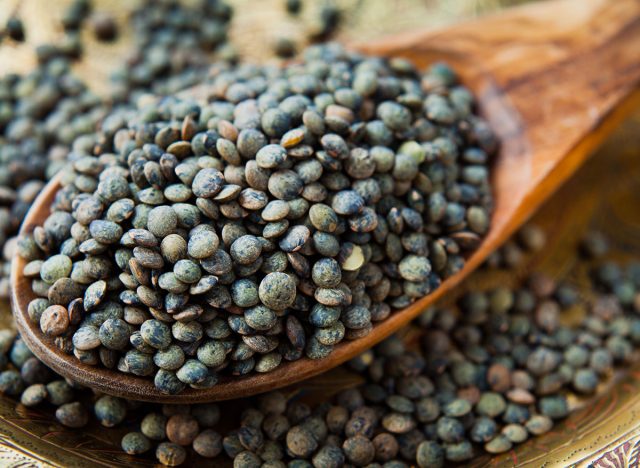

Lentils are members of the same legume family as beans. They are dried, protein-packed seeds. They come in brown, red, yellow, black, and other varieties. No matter which type of lentil you eat, it will be a healthy source of protein. A cup of lentils has around 18 grams of protein for 230 calories, which is very similar to most types of beans. Lentils also provide B vitamins, iron, zinc, potassium, and magnesium. They also are rich in antioxidants that can help reduce inflammation and reduce the risk for chronic diseases. According to research published in the International Journal of Molecular Sciences lentils are rich in bioactive compounds that help reduce the risk of diabetes, obesity, cancers, and cardiovascular disease.




